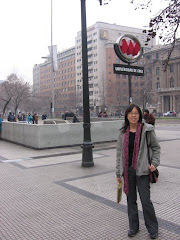A few weeks ago when I first arrived in Peru, I was struck by how many big shiny shopping centers I saw in Lima, and the country's new cautious sense of optimism about the fast-growing economy and recently elected president Alan Garcia. I started to think I wasn't "roughing it" after all, that Peru was modernizing fast.
Then my flight from Lima to Trujillo was delayed twice. Well, delayed doesn't quite do it justice. The truth is, we took off from Lima an hour late with warnings that the weather in Trujillo was bad; we circled Trujillo, began our descent and then sharply pulled up with no explanation, and continued on to the next stop (Chiclayo). At Chiclayo we were offered the option of a 3-hr bus ride to Trujillo, or staying on the plane and trying to land on the flight back to Lima. About 15 out of 80 Trujillo-bound passengers stayed on board, based on predictions that the weather in Trujillo was clearing up.
Well, the exact same thing happened on the way back to Lima. Gradual descent, sharp pull up, and before you know it we were back in Lima. We all claimed our baggage, got booked on the next flight (that night), made our phone calls, and got ready to kill seven hours in the airport. Finally we got on the night flight... and the exact same thing happened. Only this time there was no stopover in Chiclayo before flying back to Lima.
In speaking with another frustrated passenger, a native trujillano, I discovered this problem happens from time to time, but only with Trujillo's airport because they don't use radar or other instruments, and pilots have to land by sight. In other words, a few too many clouds means no landing.
All I know is, when in Peru, be flexible.

The food court at Lima Airport's "Peru Plaza", where I spent most of Friday, May 11

layover in Chiclayo

Finally arrived in Trujillo Saturday evening!






